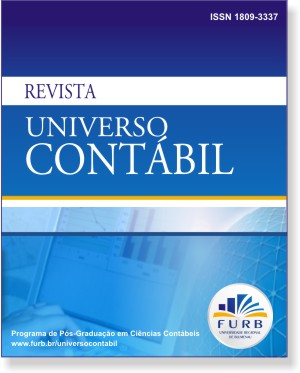RESEARCH ON THE PERCEPTIONS OF FIRST YEAR ACCOUNTING STUDENTS IN SÃO PAULO CONCERNING THE DIFFICULTIES THEY FACE WHEN STUDYING AT NIGHT
DOI:
https://doi.org/10.4270/ruc.20084Keywords:
Contabilidade. Estudo e ensino superior. Educação de adultos. Ensino noturno.Abstract
This work studied the perception of 439 students from six universities and faculties in Sao Paulo concerning the difficulties they face during the first year of their Accounting course studying at night. Through the use of a two part questionnaire, it was possible to determine the pattern of response of those who answered it and also to evaluate the students` perception. The obtained data was treated by means of inferential statistics. The question was to find out whether there were differences in the perception of the difficulties faced by the students, in accordance with the characteristics that made up their respective profiles. The results indicate that the perception of the difficulties between the six groups has little or no difference in terms of agreement or disagreement. However, the degree of agreement or disagreement among the six groups varied for each difficulty analyzed. The results suggest the continuity of the data analysis, as well as the application of the research for other courses and its institutionalization in permanent data bases. Keywords: Accounting. Higher education and teaching. Adult education. Nighttime study.Downloads
Download data is not yet available.
Downloads
How to Cite
Peleias, I. R., Petrucci, V. B. C., Garcia, M. N., & Silva, D. da. (2008). RESEARCH ON THE PERCEPTIONS OF FIRST YEAR ACCOUNTING STUDENTS IN SÃO PAULO CONCERNING THE DIFFICULTIES THEY FACE WHEN STUDYING AT NIGHT. Revista Universo Contábil, 4(1), 81–94. https://doi.org/10.4270/ruc.20084
Issue
Section
National Section
License
The copyright for papers published in this journal belong to the author, with rights of first publication for the journal. As the papers appears in this publicly accessed journal, the papers are for free use, receiving their credit, in educational and non-commercial uses. The journal will allow the use of the papers published for non-commercial purposes, including the right to send the paper to publicly accessed databases.


